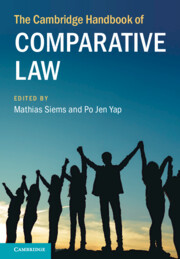Book contents
- The Cambridge Handbook of Comparative Law
- The Cambridge Handbook of Comparative Law
- Copyright page
- Contents
- Figures
- Tables
- Contributors
- Preface
- Abbreviations
- 1 Introduction
- Part I Methods of Comparative Law
- Part II Legal Families and Geographical Comparisons
- Part III Central Themes in Comparative Law
- Part IV Comparative Law beyond the State
- 28 Comparative International Law
- 29 Transnational Regulation
- 30 Quantitative Forms of Legal Governance
- 31 Comparative International Arbitration Law
- 32 Cross-Border Judicial Dialogue
- 33 Comparing Regional Law
- 34 Comparative Conflict of Laws
- 35 Comparative Indigenous Law
- 36 Comparative Legal Education
- Index
35 - Comparative Indigenous Law
from Part IV - Comparative Law beyond the State
Published online by Cambridge University Press: 26 January 2024
- The Cambridge Handbook of Comparative Law
- The Cambridge Handbook of Comparative Law
- Copyright page
- Contents
- Figures
- Tables
- Contributors
- Preface
- Abbreviations
- 1 Introduction
- Part I Methods of Comparative Law
- Part II Legal Families and Geographical Comparisons
- Part III Central Themes in Comparative Law
- Part IV Comparative Law beyond the State
- 28 Comparative International Law
- 29 Transnational Regulation
- 30 Quantitative Forms of Legal Governance
- 31 Comparative International Arbitration Law
- 32 Cross-Border Judicial Dialogue
- 33 Comparing Regional Law
- 34 Comparative Conflict of Laws
- 35 Comparative Indigenous Law
- 36 Comparative Legal Education
- Index
Summary
States in sub-Saharan Africa struggle to manage the multiple legal orders bequeathed by European colonialism. This struggle is partly attributable to poor consideration of indigenous African values by policymakers. Values are useful because they distinguish social habits from the sense of obligation that gives law its normative character. Since the foundational values of indigenous laws reflect the welfare-oriented origins of indigenous laws, they illumine how Africans adjust to modern conditions, as well as the adaptive character of legal pluralism in Africa. However, not much is known about these values in the courts, in contradiction with the prominence that jurists accord to constitutional values. This chapter compares how African legal frameworks reflect the values of indigenous laws in Kenya, Nigeria, Somaliland, and South Africa. It finds that judges and legislators adopt jurispathic approaches to the regulation of indigenous laws, and suggests that reliance on the values of indigenous laws could promote their harmonisation with statutory laws.
- Type
- Chapter
- Information
- The Cambridge Handbook of Comparative Law , pp. 693 - 712Publisher: Cambridge University PressPrint publication year: 2024

